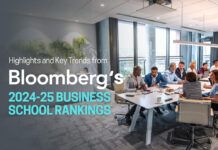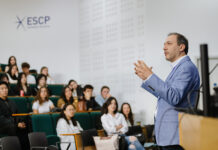Interview with Daniella Laureiro-Martinez of ETH Zürich
In this interview with EBR, Daniella Laureiro-Martinez of the Department of Management, Technology, and Economics at ETH Zürich, discusses the emba X program, ETH Zurich’s and the University of St.Gallen’s Executive MBA program, and its efforts to equip today’s leaders with the skills to navigate complex challenges and inspire meaningful impact.
Dr. Laureiro Martinez, you have an impressive background in cognitive science, decision-making, and adaptive leadership. Could you share what initially drew you to the field of cognitive flexibility and leadership?
It is hard to pinpoint exactly one motivating reason. I recall having an admiration for people who show versatility and adapt when their world changes drastically, even when their world crumbles. I recall feeling curious about that from an early age. As my professional career progressed in industry, I made space and had the privilege- to explore my curiosity in a structured manner, and thus did my PhD in this area.
Your career spans academia and practical consulting. How has your experience in business and government consulting influenced your approach to research and teaching?
To continuously adapt, leaders need to help their organizations explore new opportunities and exploit good ones.
As a young consultant, I got to work long hours in close proximity to leaders of a multitude of very different organizations. They were often the founders, the successors to the founders, or the CEOs, and I worked with profit, non-profit, and government. The projects were intense and I could closely observe the behaviors of each of these leaders, almost “shadowing” them, but also switching enough as not to be too embedded into any single organization, but rather be able to go in and out, and learn from many of them. Those experiences left an imprint on me and my mind often goes back to those years.
Your research emphasizes cognitive control, attention, and adaptability in decision-making. How do you see these cognitive abilities impacting leadership effectiveness in dynamic business environments?
Luck might help adapt once to environmental change. However, in the mid and long term, adapting once is not sufficient because change pervades. To continuously adapt, leaders need to help their organizations explore new opportunities and exploit good ones. This requires a combination of attention control and routinization. These are two cornerstones of my work and that of our group.
The emba X program aims to shape leaders who are both socially responsible and technologically savvy. How does the program empower participants to blend ethical leadership with cutting-edge technology to drive transformative change in their organizations and communities?
I think that the responsible take on being tech-savvy is embedded into the learning objectives of the entire program. In my own teaching and coaching, we encourage each participant to depart from improving their understanding in order to better know what they have, what they want to consolidate, acquire, and get rid of to be a better leader of themselves, their organizations, and ultimately, to have a better impact. In my courses, we start from ourselves: our own abilities (for example attention control, our own personality, our values and beliefs). If I better know what I have and what I want, I depart from a better place to act consistently with my own goals and values. Other courses focus on complementary aspects. For example, I can know well what I have and what I want in terms of my own abilities to lead, but I also have to know well what a certain technology might cause, not only in terms of tech efficiency, but in terms of environmental impact, of social impact, and not think only of what we see here and now, but also what might happen down the road. My courses take the individual abilities behind such thinking processes. For example, do I have the empathy needed to make such assessments about others? Do I have a future perspective? The foresight ability? When taken together as a program, looking at the learning journey that we have designed in the emba X program, participants can put together these new pieces of knowledge and adjust them to their specific environments, their work needs, and their personal lives and this, I believe, can help them make better decisions.
With its emphasis on holistic development, the emba X program addresses self-leadership, team dynamics, and integrative leadership. How does the program use innovative approaches and experiential learning to foster profound personal growth and equip leaders with the skills to navigate complex challenges and inspire meaningful impact?
We truly focus on the participants’ own learning journeys. Everyone’s path is different: everyone starts from a different place, with different individual personalities, abilities, and goals. The courses offer some foundational topics and training on abilities. Many are organized as active interventions, where each person takes what they need, even the level of difficulty depends on where one stands, and how much one wants to improve on that specific aspect. The experiential learning aspect derives from this: your goals are relevant to yourself as a participant in your daily life – we have learning goals to achieve with the courses, of course, but your goals as a participant automatically make the program your own experience.
The executive education sector has seen significant changes recently, particularly with the rise of digital learning platforms. How do you see these trends impacting traditional executive education programs?
I see these new platforms as tools to enrich our toolkit, and to hopefully enrich our experiential learning, involving more senses, and more ways to acquire and store information. I see big opportunities and feel curious to explore new ways. That said, I also see that sometimes a blank piece of paper paired with a sharpened pencil and a sharp curious mind are more than enough tools to facilitate reflection and learning.
What role does cognitive flexibility play in the emba X program, and how do you incorporate this concept into the course design and delivery?
Cognitive flexibility is a foundational ability, one that guides and supports our entire thinking, and thus problem-solving, foresight, creativity, etc.
Cognitive flexibility is a foundational ability, one that guides and supports our entire thinking, and thus problem-solving, foresight, creativity, etc. Understanding that it is such a foundational ability, we have a dedicated course to its measurement and training, and we have placed this course very early in the program. In turn, this course is connected with other courses, and as Faculty, we make an effort to highlight these connections, so that participants can cumulatively build on their knowledge about their own cognitive flexibility, and find ways to deploy it. For example, Faculty colleagues refer to it when teaching creativity, integrative complexity, in individual projects, and in the final closing weeks.
How does the synergy between ETH Zurich’s technology focus and the University of St.Gallen’s leadership expertise in the emba X program create a unified experience that equips leaders for today’s challenges?
This is more for the participants to answer. From my side, I can speak more about the intention, to bring the excellence of the two institutions into a rigorous program that tries to respond to the current needs from our leaders while anticipating what could be their future needs too.
Looking ahead, what are the next big questions or areas of research you plan to explore in the realm of cognitive flexibility and adaptive behavior, and how might these influence future executive education?
There is so much work to do on this. Generally, in our group, we want to provide solid evidence to our trainings, so we are investigating some foundational abilities in two main areas: cognitive flexibility, and multiple-goal integration. We are a multi-disciplinary group, and we want to really understand the components of these abilities, all the way from the brain functioning, to what impact they have in organizations. With that, we then want to have more solid evidence on how to train these abilities.
Providing evidence is a hard task, but with resources and effort, certainly doable. Solid evidence is a different story: there are many moving parts when we study human behavior in real organizational settings. We are complex beings that operate in multifaceted organizations and the myriad of variables that we need to understand in order to decide whether we need to prioritize them in our research or not is not short. In addition, we are exploring new grounds, so we can rarely rely on existing data, but in most cases, we have to collect it ourselves. And much of the data we rely on comes from samples of participants who are not easily available (like the leaders of our emba X program, for example!). So in all, working on these two foundational abilities keeps us rather busy!
Executive Profile



























![“Does Everyone Hear Me OK?”: How to Lead Virtual Teams Effectively iStock-1438575049 (1) [Converted]](https://www.europeanbusinessreview.com/wp-content/uploads/2024/11/iStock-1438575049-1-Converted-100x70.jpg)




